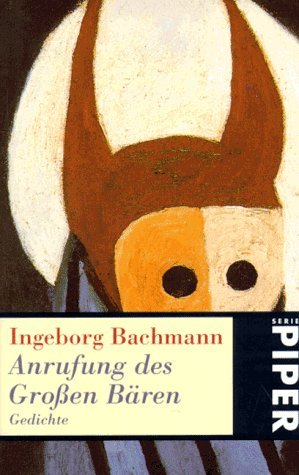What do you think?
Rate this book


78 pages, Paperback
First published January 1, 1956
- Invocation of the Great Bear, pg. 21
- Days in White, pg. 41-42
- Advertisement, pg. 44
- Rome at Night, pg. 60
- Black Waltz, pg. 63
- Shadows Roses Shadow, pg. 65
Innen ist dein Mund ein flaumiges Nest
für meine flügge werdende Zunge.
Innen ist dein Fleisch melonenlicht,
süß und genießbar ohne Ende.
Innen sind deine Adern ruhig
und ganz mit dem Gold gefüllt,
das ich mit meinen Tränen wasche
und das mich einmal aufwiegen wird.
Wenn alle Krüge zerspringen,
was bleibt von den Tränen im Krug?
Unten sind Spalten voll Feuer,
sind Flammenzungen am Zug.
Ein Horn stak im Land,
vom Leittier verrannt,
ins Dunkel gerammt.
Wenn einer geht muß er den Hut
mit Muscheln, die er sommerüber
gesammelt hat, ins Meer werfen
und fahren mit wehendem Haar,
er muß den Tisch, den er seiner Liebe
deckte, ins Meer stürzen,
er muß den Rest des Weins,
der im Glas blieb, ins Meer schütten,
er muß den Fischen sein Brot geben
und einen Tropfen Blut ins Meer mischen,
er muß sein Messer gut in die Wellen treiben
und seinen Schuh versenken,
Herz, Anker und Kreuz,
und fahren mit wehendem Haar!
Dann wird er wiederkommen.
Der Schlachttag naht mit hellem Messerwirbel,
die matten Klingen schleift der Morgenwind,
und aus der Brise gehn gestärkt die Schürzen
der Männer, die ums Vieh versammelt sind.
Das Ruder setzt auf dem Gong mit dem schwarzen Walzer ein,
Schatten mit stumpfen Stichen nähn die Gitarren ein.
Unter der Schwelle erglänzt im Spiegel mein finsteres Haus,
Leuchter treten sich sanft die flammenden Spitzen aus.
Schönes Licht, das uns warm hält, bewahrt und wunderbar sorgt,
Daß ich wieder sehe und daß ich dich wiederseh!
Nichts Schönres unter der Sonne als unter der Sonne zu sein ...
Nichts Schönres als den Stab im Wasser zu sehn und den Vogel oben,
Der seinen Flug überlegt, und unten die Fische im Schwarm,
Gefärbt, geformt, in die Welt gekommen mit einer Sendung von Licht.
Mein lieber Bruder, wir zeichnen aufs Papier
viele Länder und Schienen.
Gib acht, vor den schwarzen Linien hier
fliegst du hoch mit den Minen.